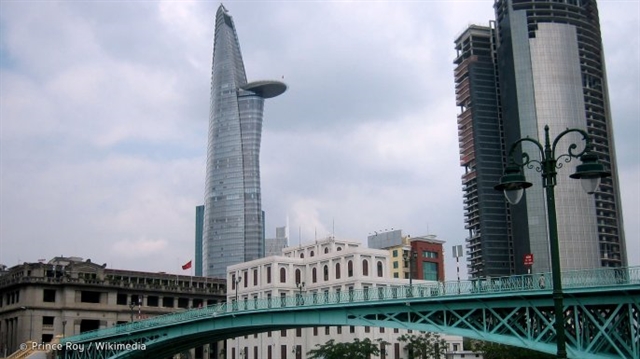 Economy
Economy


|
| Office buildings in Distrcit 1, HCM City. — VNA Photo |
HCM CITY Large office space and improved connectivity will be in high demand in coming years, according to market researcher Jones Lang LaSalle (JLL).
In report forecasting trends in the Vietnamese real estate market, JLL said that office space remains a hot commodity as rents have soared past the recent peak to reach a decade high.
Rental rates in Grade A and B buildings have increased, supported by strong demand and higher rental rates in newer office developments. Tenants are struggling to find bigger space because in the current market, only one Grade A building and 10 Grade B buildings can provide a contiguous space larger than 1,000 sqm, the researcher said.
The demand for large office space will accelerate in the next few years as co-working operators grow in numbers and companies look to upgrade their office to retain talent and expand businesses. Larger and more flexible space means a better chance of collaboration plus better use of energy and space.
In the fast-changing retail sector, success has never been more dependent on the supply chain, JLL said.
“Omni-channels are adding new layers of complexity to retail logistics: it’s no longer just getting products on shelves, but making them available anytime and anywhere. As a new trend in the market, both retailers and mall developers are reinventing themselves with focus on F&B and experiential retailers, providing better customer services and applying technology, consumer analytics to enhance their popularity and increase foot traffic,” the company said.
JLL also forecasts that limited new supplies will continue.
According to the latest report from JLL, about 30,000-35,000 units are expected to launch officially in HCM City and 40.000-45.000 units in Hà Nội in 2020. However, the number is subject to a great deal of uncertainty given the Government’s tight control in granting land-use rights and construction licences.
Strong demand is set to carry on and will boost the price further across all sectors, JLL said. However, the demand in high-end segments, especially from investors, is likely to slow down in the long term as their already-high price level and low rental yield make it a less attractive investment.
The green movement also received a tremendous boost after "fine dust" and "virus" became buzzwords. As people rush to buy masks, landlords are racing to upgrade their buildings to protect workers and enhance profits as investments in indoor air quality and hygiene help to differentiate office buildings from competitors.
Stephen Wyatt, country head of JLL Vietnam, said: “Sustainability is not just a trend, it has to be the future of work. The next generation of buildings is set to become more ‘green’, with sustainable technologies to save on operating costs and innovative design to attract more occupiers and tenants.”
The industry is still the hottest sector in the market with demand growing strong as companies are still looking to relocate from China amid political uncertainty. Even before the trade war, significant interest from foreign investors had led to land value and rental rate on the increase.
Manufacturing is the sector with the most significant investment in the past 10 years, and JLL predicts that it will continue to dominate the market in the next few years.
Logistics is expected to be the future of the industrial market. In recent years, increasing demand from both traditional retail and continuous growth from e-commerce sectors has put great pressure on existing supply chains, facilities and warehouses.
JLL predicts that the growth of retail will contribute to investment activities related to the current shortfalls of the industry.
Overall, macroeconomics like urbanisation, growth in smartphone and internet usage, and an ageing population, will fuel demand for alternative investment choices. Alternative real estate such as senior and student housing, data centres, and cloud kitchens will be popular to investors in the next few years. — VNS